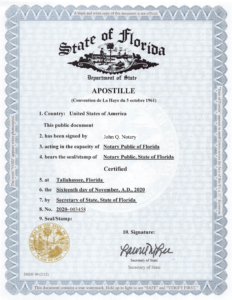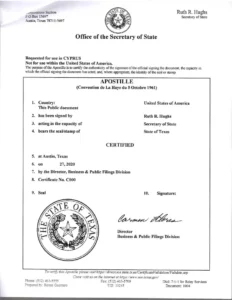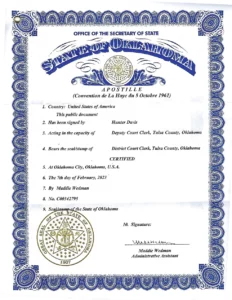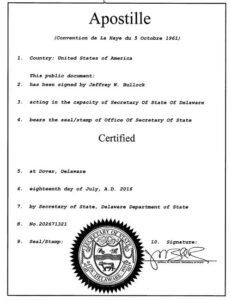How to legalize a document in the US
What you need to know (first)
Also known as “APOSTILLE“, the legalization, in the context of documents, is the process of officially verifying the authenticity and validity of a document, particularly one issued in a foreign country or by a non-US governmental body. This process ensures that the document is recognized as legitimate in the US context.
Types of Legalization
There are several ways to legalize a document in the US, each with its own nuances:
- Authentication: This process verifies that the document is genuine and that the issuing authority is legitimate. Often, this involves a state or federal agency in the originating country.
- Certification: This is related to notarization. It confirms a person’s identity and that the signature on the document is genuine. Often required for documents to be used in legal proceedings.
- Affidavit: This is a written declaration sworn before an officer who has the authority to administer oaths–often done by a notary. This provides a formal declaration about the document but the legal force often depends on the context.
- Apostle’s Convention: This is a specific form of legalization for documents circulated between signatory countries to the Hague Convention. It often involves a simplified process.
- Consular legalization: May be required in conjunction with the above procedures before the document is accepted, particularly for documents originating from certain countries or for use by certain entities.
In this post, we will focus on the fourth case, namely, the Hague Convention (Apostille). This is the document you will need to get from the U.S. to make it valid, for example, in Spain whilst applying for your visa.
Important considerations
1. Original Documents: Often, the original document is needed, not just a copy.
2. Translation: If the document is in a language other than English or Spanish, it must be translated accurately and certified by a certified translation agency or translator.
3. Time Frame: Allow ample time for processing, particularly if dealing with an international document or the US destination has a tight deadline.
4. Legal Professionals: For complex situations (e.g., legal proceedings, international adoption, or a specific high-value document), consult with a legal professional specializing in document legalization.
CASE STUDY: criminal background (police record) legalization in the U.S.
U.S. citizens may require a “certificate of good conduct” (or similar proof of no criminal record) for various reasons abroad, including adoption, school enrollment, or employment. This process is less common in the U.S., meaning U.S. police may not be familiar with it. Fortunately, several options are available for U.S. citizens to establish their clean criminal record abroad.
LOCAL POLICE CHECK:
Contact your local or last U.S. police department to request a local or state criminal background check. Request a document confirming no criminal record. Some departments may require an in-person visit. Finally, verify if the country where you intend to use these records requires further authentication steps.
FBI RECORDS CHECK:
The Criminal Justice Information Services (CJIS) Division of the Federal Bureau of Investigation (FBI) is in charge of an FBI records check. They are responsible for criminal justice information. They work with law enforcement and governments around the world. They also work with private organizations and citizens like you.
The FBI offers two ways to request your FBI Identification Record or to prove that no record exists:
- You may get a copy of your record by submitting a written request to the CJIS Division. The request must include proof of identity. This proof must include your name, date and place of birth, and a set of rolled-inked fingerprints (which can usually be obtained at your local police department). If there is no criminal record, they provide a report reflecting this fact. The FBI will not provide copies of other people’s arrest records to you. See www.FBI.gov for current processing fees and more information. See also Identification Record Request and Guide for Obtaining Your FBI Identification Record. Lastly, see Submitting an Identification Record Request to the FBI.
- You may also submit a request through an FBI-approved channeler. A channeler is a private business that has contracted with the FBI. They receive your fingerprint submissions and data. They also collect any fees. Then they send the submissions and information to the FBI. The FBI will give them the background check results, and they will give them to you. See www.FBI.gov for the list of FBI-approved channelers.
Important Note: If you need an apostille or authenticated copy or are a non-U.S. national or permanent resident, you must submit your request directly to the FBI CJIS Division.
- An apostille or authenticated copy of your FBI Identification Record
- An FBI Identification Record as a non-U.S. national or permanent resident
The U.S. Department of State Authentications Office can attach an apostille to a document for countries in the Hague Apostille Convention. For countries not in the convention, they will add a certification over the FBI seal.
And finally, How To Legalize a Document in the US (authentication, apostille)
CJIS can authenticate U.S. Department of Justice Order 556-73 fingerprint search results for international use if requested at the time of submission. This involves placing the FBI seal and a division official’s signature on the results.
If needed, you can submit these authenticated results to the U.S. Department of State Authentications Office for further authentication, specifying the intended destination country.
Documents from local police departments typically require additional authentication beyond their seal. Contact your state’s Secretary of State’s office or other designated authority for assistance authenticating state-issued documents. Refer to our general guidance on authenticating documents for use abroad.
In the case of a Visa to Spain
Police Criminal Record clearance must be verified by fingerprints. It cannot be older than 3 months from the application date with a certified translation into Spanish. The certificate must be issue from either:
a) State Department of Justice. Original clearance letter form signed (from the States where you have lived during the past 5 years). It must be legalized with the Apostille of the Hague Convention from the corresponding Secretary of the State.
b) FBI Records, issued by the US Department of Justice – F.B.I. It must be legalized with the Apostille of the Hague Convention from the US Department of State in Washington DC, for instance.
You must also get a police record from the countries where you have lived during the past 5 years.




















